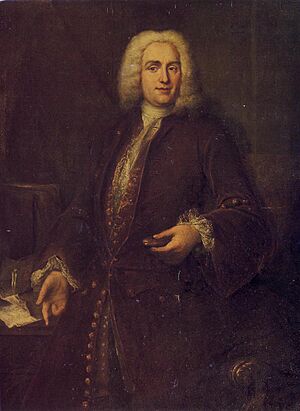Joseph Bodin de Boismortier facts for kids

Joseph Bodin de Boismortier (born December 23, 1689 – died October 28, 1755) was a famous French Baroque composer. He wrote many kinds of music, including pieces for instruments, songs (called cantatas), and even operas with dancing (called opéra-ballets). Boismortier was special because he was one of the first composers who didn't need rich sponsors (patrons). He earned a lot of money by publishing and selling his music directly to the public. He got a special royal license to print music in 1724, which helped him become very wealthy.
The Life of a Composer
Joseph Bodin de Boismortier was born in Thionville, France. His family later moved to Metz, where he started his music lessons. His teacher was Joseph Valette de Montigny, who was known for writing church music. In 1713, Boismortier's family followed Montigny to Perpignan. There, Boismortier found a job working for the Royal Tobacco Control.
Boismortier married Marie Valette. She was the daughter of a wealthy goldsmith and a relative of his teacher, Montigny. In 1724, Boismortier and his wife moved to Paris. This is where he began his amazing career as a composer. He wrote music for many different instruments and singers. He wrote a lot of music very quickly! His first works came out in Paris in 1724. By 1747, he had published over 100 pieces of music. His music, especially his songs, was very popular. This popularity made him rich without needing any patrons.
Boismortier was the first French composer to use the Italian concerto style. He wrote six concertos for five flutes in 1727. He also wrote the first French solo concerto for any instrument. This was a concerto for cello, viol, or bassoon in 1729. Much of his music is for the flute. He even wrote a guide on how to play the flute, but it is now lost.
Boismortier and another famous composer, Rameau, lived during the Rococo period of Louis XV. They both kept the French music tradition alive. They composed beautiful and fancy music that many people enjoyed. Even though he was a great composer, Boismortier was also known for being a bit forgetful. He often had a wandering mind, which sometimes kept him from leading his own musical performances.
His six sonatas for flute and harpsichord, published in 1742, are very well-known today. They were dedicated to the famous French flutist, Michel Blavet. These pieces show Boismortier at his most creative and graceful. Another one of his pieces that is still often played is the Deuxieme serenade ou simphonie.
Boismortier died in Roissy-en-Brie. He asked to be buried in the Eglise Saint Germain church there. His daughter, Suzanne Bodin de Boismortier, became a playwright and novelist.
A Famous Quote
A music expert named Jean-Benjamin de la Borde wrote about Boismortier in 1780. He said: "Happy is Boismortier, whose fertile pen can give birth without pain to a whole new volume of music every month." This means Boismortier wrote music very easily and quickly!
When people made comments like this, Boismortier would simply reply, "I'm earning money." This shows he was proud of his success and how he made a living from his music.
Main Musical Works
Here are some of Joseph Bodin de Boismortier's important musical works:
- Les quatre saisons (The Four Seasons), cantatas (1724)
- Six concertos for five flutes, Op. 15 (1727)
- Concerto for cello, viol, or bassoon (1729)
- Les voyages de l'amour (The Journeys of Love), an opera ballet (1736)
- Don Quichotte chez la Duchesse (Don Quixote at the Duchess's House), a funny ballet (1743)
- Daphnis et Chloé, a pastoral (countryside-themed) opera (1747)
- Cinquante-neuvième oeuvre de M.Boismortier, contenant quatre suites de pièces de clavecin (Boismortier's 59th Work, containing four suites of harpsichord pieces) for harpsichord
- Daphné, a serious opera (never performed) (1748)
- Les quatre parties du monde (The Four Parts of the World) (1752)
- Les gentillesses (The Niceties), short cantatas
- Many other concertos and sonatas
 | Selma Burke |
 | Pauline Powell Burns |
 | Frederick J. Brown |
 | Robert Blackburn |

